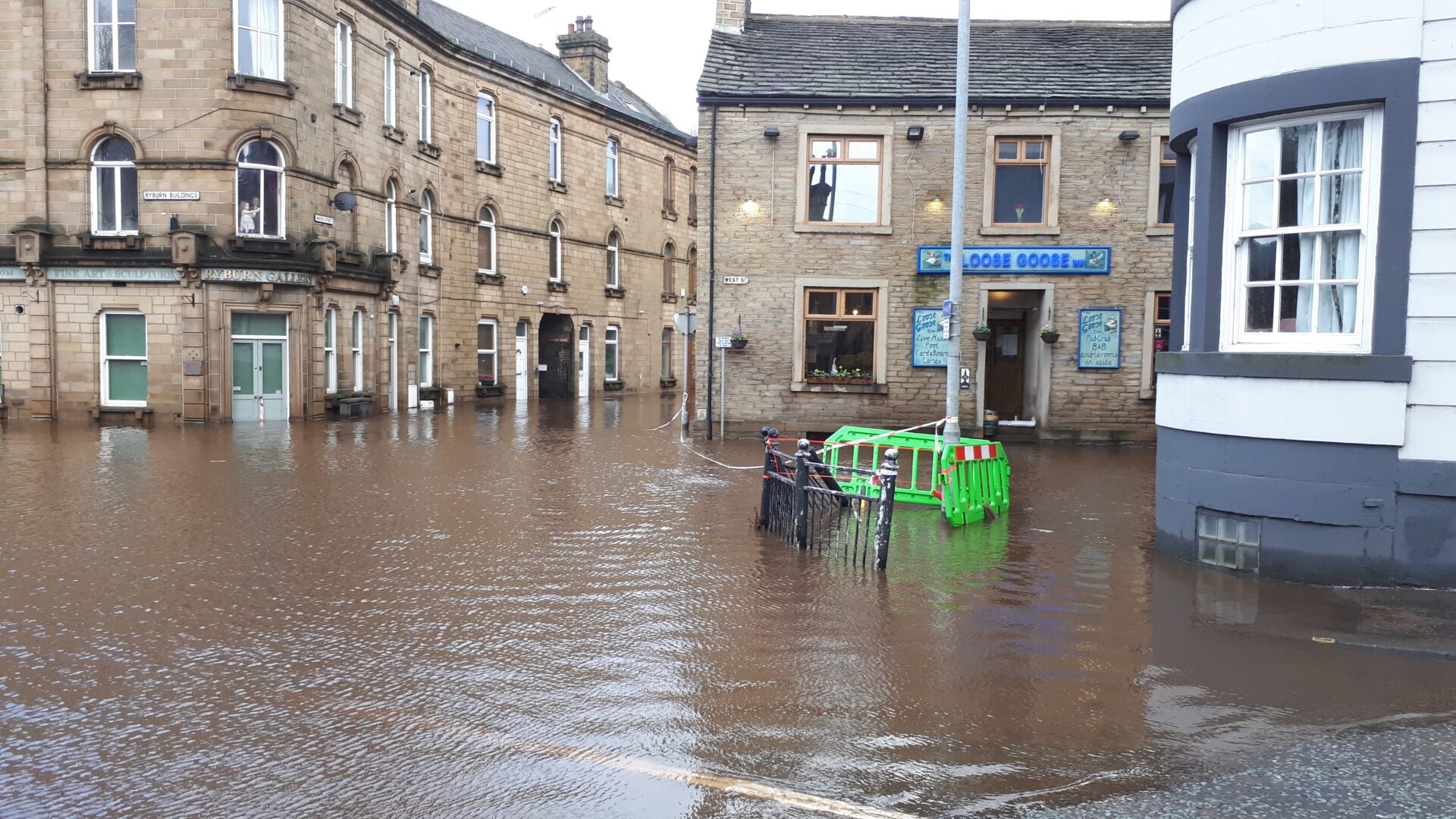
Picture courtesy of Dave Connolly, Calderdale Council
Hundreds of people across West Yorkshire, who live in communities at risk of flooding, are being urged to take part in new research to help reduce the impact on the mental health of flood victims and provide them with the vital support they need.
A large-scale online survey is being carried out by researchers at the Healthy Housing Initiative, University of Huddersfield, as part of a West Yorkshire Flood Innovation Programme project, led by Kirklees Council and supported by the Environment Agency. This survey or Mental Health Needs Assessment (MHNA) will be used to gather evidence, which will be used to inform the delivery of mental health services by Kirklees Council and in future other local authorities for people affected by flooding.
International studies show that climate-related disasters such as flooding have a significant impact on the mental health of households, with communities suffering from psychological distress, anxiety, and longer-term trauma. As a result of climate change, such disasters are becoming more frequent and severe.
However, there remains a lack of understanding of these impacts at the local level, particularly in areas like Kirklees and across West Yorkshire.
This project aims to provide the evidence needed to develop new, innovative and effective approaches to mitigate these risks and improve flood resilience for communities.
Major challenges faced by Kirklees Council and other local authorities include making sure communities have access to mental health and resilience support following disasters, such as flooding and raising awareness of the risks so that households can be as prepared as possible.
Survey of communities at risk of flooding
Initially, around 500 online questionnaires will start to be distributed from September amongst communities at risk of flooding through flood groups, flood managers and community workers. The questionnaires will also be promoted through publications and social media.
The second stage of the project will be to carry out around 50 in-depth interviews in September with households who have been flooded or are at risk of flooding. There will also be five workshops for community groups to help come up with new solutions and design resources, such as a toolkit that would help people prepare for flood events.
Ultimately, the survey will help flood managers understand:-
- Is flooding having an impact on residents’ mental health, and if so, at what scale?
- What support is available to residents? Do they know how to access it, and are there any barriers preventing them from getting help?
- What can the council do to improve the situation?
- What do communities need to help improve their mental health and wellbeing in relation to flooding and other risks?
The Mental Health Needs Assessment (MHNA), funded by Kirklees Council, is connected to broader research in a Creating Opportunities through Local Innovation Fellowship (COLIF). This Fellowship will go beyond flooding covering broader climate-related weather disasters, including wildfires and is funded by UK Research and Innovation (UKRI) through the ESRC COLIF Scheme, with additional support from the ESRC Impact Acceleration Account (IAA) at the University of Huddersfield.
It supports collaborative knowledge exchange, the broader sharing of findings from the MHNA, and the development of future funding proposals with regional partners to improve climate resilience and wellbeing.
Creating Opportunities through Local Innovation Fellowships (COLIF) are typically short-term funding programmes focused on advanced research. The primary goal of COLIF is to promote local innovation and reduce regional inequalities by bringing together different sectors to work on shared challenges. The Fellowship will build on the existing framework developed through WYFLIP and support collaboration between academic institutions, including the University of Huddersfield and Liverpool, local authorities and community organisations to work together to come up with practical, scalable solutions to key issues.
How will the findings be used?
Findings from the research will be used to develop a policy briefing with recommendations for policy makers, local authorities and housing organisations, both locally and regionally. Results of this needs assessment will also be used as evidence to successfully bid for funds to develop initiatives or resources to improve wellbeing and preparedness amongst communities.
Dr Dillon Newton, Research Fellow, is leading the mental-health needs assessment work, and the COLIF Fellow is Dr Tom Simcock, both at the University of Huddersfield.
This assessment will provide the evidence we need to understand and address the mental health impacts of flooding and ensure support services are truly responsive to at-risk communities.
Dr Dillon Newton
“As climate-related disasters like flooding and wildfires become more frequent, this COLIF Kirklees Climate Resilience and Mental Health Fellowship is an important opportunity to work together to address their impacts on mental wellbeing. This Fellowship provides an exciting opportunity to collaborate with colleagues, communities, and local partners to co-develop strategies that will build resilience and support those most affected.”
Dr Tom Simcock, COLIF Fellow and Research Fellow
The three main outcomes from the project will be:-
- Good practice guide for integrating mental health support into disaster risk community preparedness strategies
- Funding applications for future grant funding to support the rollout of a targeted intervention
- New academic-policy network to support the advancement of knowledge and solutions to mental health and climate-related disasters (flooding, fire, storms, etc). This network would then co-create further projects and development activities to sustain this initiative in the long term.
To take the survey visit: https://hud.eu.qualtrics.com/jfe/form/SV_0Hruoj1K3HHW5Om

